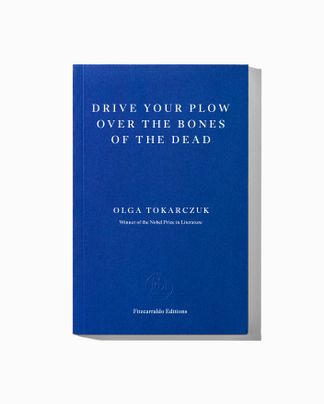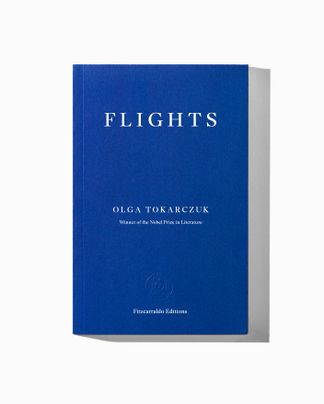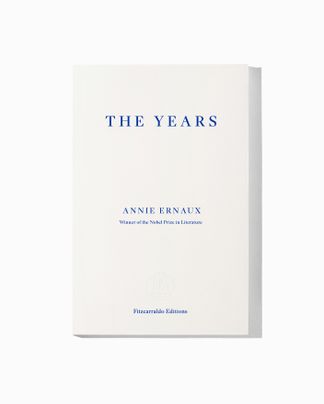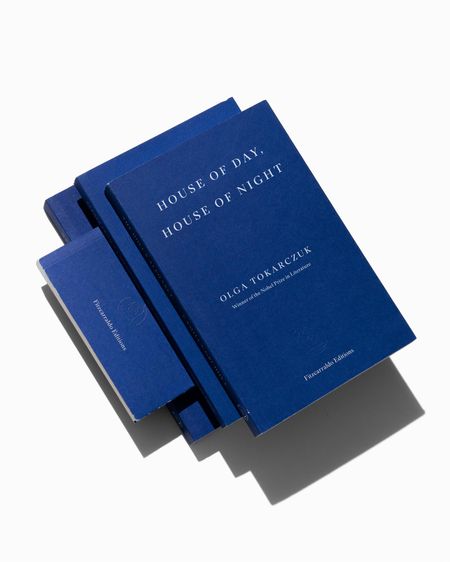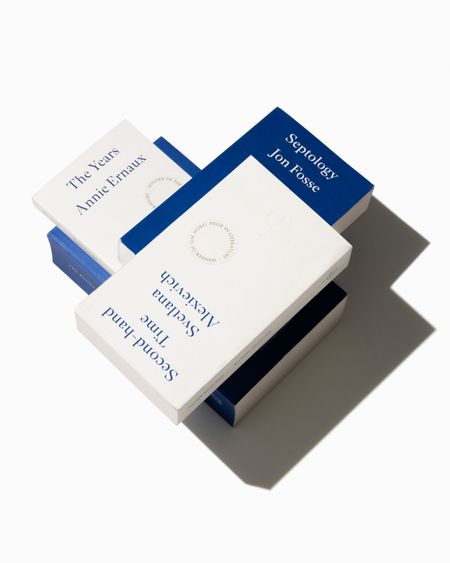In the mid-eighteenth century, as new ideas begin to sweep the continent, a young Jew of mysterious origins arrives in a village in Poland. Before long, he has changed not only his name but his persona; visited by what seem to be ecstatic experiences, Jacob Frank casts a charismatic spell that attracts an increasingly fervent following. In the decade to come, Frank will traverse the Hapsburg and Ottoman empires, throngs of disciples in his thrall as he reinvents himself again and again, converts to Islam and then Catholicism, is pilloried as a heretic and revered as the Messiah, and wreaks havoc on the conventional order, Jewish and Christian alike, with scandalous rumours of his sect’s secret rituals and the spread of his increasingly iconoclastic beliefs. In The Books of Jacob, her masterpiece, 2018 Nobel Prize in Literature laureate Olga Tokarczuk writes the story of Frank through the perspectives of his contemporaries, capturing Enlightenment Europe on the cusp of precipitous change, searching for certainty and longing for transcendence.
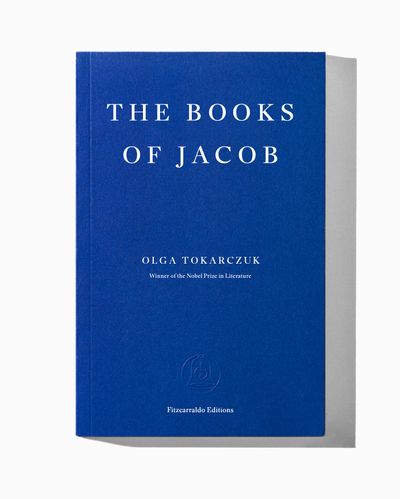
The Books of Jacob
Translated by Jennifer Croft
Published 15 November 2021 | French paperback with flaps, 928 pages
Shortlisted for the 2022 International Booker Prize | Longlisted for the 2022 National Book Awards | Shortlisted for the 2023 Wingate Prize | Shortlisted for the 2023 EBRD Literature Prize
The Books of Jacob
Translated by Jennifer Croft
THE BOOK OF FOG
I .
1752, ROHATYN
It’s early morning, near the close of October. The vicar forane is standing on the porch of the presbytery, waiting for his carriage. He’s used to getting up at dawn, but today he feels just half awake and has no idea how he even ended up here, alone in an ocean of fog. He can’t remember rising, or getting dressed, or whether he’s had breakfast. He stares perplexed at the sturdy boots sticking out from underneath his cassock, at the tattered front of his faded woollen overcoat, at the gloves he’s holding in his hands. He slips on the left one; it’s warm and fits him perfectly, as though hand and glove have known each other many years. He breathes a sigh of relief. He feels for the bag slung over his shoulder, mechanically runs his fingers over the hard edges of the rectangle it contains, thickened like scars under the skin, and he remembers, slowly, what’s inside – that heavy, friendly form. A good thing, the thing that’s brought him here – those words, those signs, each with a profound connection to his life. Indeed, now he knows what’s there, and this awareness slowly starts to warm him up, and as his body comes back, he starts to be able to see through the fog. Behind him, the dark aperture of the doors, one side shut. The cold must have already set in, perhaps even a light frost already, spoiling the plums in the orchard. Above the doors, there is a rough inscription, which he sees without looking, already knowing what it says – he commissioned it, after all. Those two craftsmen from Podhajce took an entire week to carve the letters into the wood. He had, of course, requested they be done ornately:
HERE TODAY AND GONE TOMORROW
ИOUSE TO MILK IS YOUR SORROW
Somehow, in the second line, they wrote the very first letter backwards, like a mirror image. Aggravated by this for the umpteenth time, the priest spins his head round, and the sight is enough to make him fully awake. That backwards И… How could they be so negligent? You really have to watch them constantly, supervise their each and every step. And since these craftsmen are Jewish, they probably used some sort of Jewish style for the inscription, the letters looking ready to collapse under their frills. One of them had even tried to argue that this preposterous excuse for an N was acceptable – nay, even preferable! – since its bar went from bottom to top, and from left to right, in the Christian way, and that Jewish would have been the opposite. The petty irritation of it has brought him to his senses, and now Father Benedykt Chmielowski, dean of Rohatyn, understands why he felt as if he was still asleep – he’s surrounded by fog the same greyish colour as his bedsheets; an off-white already tainted by dirt, by those enormous stores of grey that are the lining of the world. The fog is motionless, covering the whole of the courtyard completely; through it loom the familiar shapes of the big pear tree, the solid stone fence and, further still, the wicker cart. He knows it’s just an ordinary cloud, tumbled from the sky and landed with its belly on the ground. He was reading about this yesterday in Comenius.
Now he hears the familiar clatter that on every journey whisks him into a state of creative meditation. Only after the sound does Roshko appear out of the fog, leading a horse by the bridle; after him comes the vicar’s britchka. At the sight of the carriage, Father Chmielowski feels a surge of energy, slaps his glove against his hand and leaps up into his seat. Roshko, silent as usual, adjusts the harness and glances at the priest. The fog turns Roshko’s face grey, and suddenly he looks older to the priest, as though he’s aged overnight, although in reality he’s a young man yet.
Finally, they set off, but it’s as if they’re standing still, since the only evidence of motion is the rocking of the carriage and the soothing creaks it makes. They’ve travelled this road so many times, over so many years, that there’s no need to take in the view any longer, nor will landmarks be necessary for them to get their bearings. Father Chmielowski knows they’ve now gone down the road that passes along the edge of the forest, and they’ll stay on it all the way to the chapel at the crossroads. The chapel was erected there by Father Chmielowski himself some years earlier, when he had just been entrusted with the presbytery of Firlejów. For a long time he had wondered to whom to dedicate the little chapel, and he had thought of Benedict, his patron saint, or Onuphrius, the hermit who had, in the desert, miraculously received dates to eat from a palm tree, while every eighth day angels brought down for him from heaven the Body of Christ. For Father Chmielowski, Firlejów was to be a kind of desert too, after his years tutoring His Lordship Jabłonowski’s son Dymitr. On reflection, he had come to the conclusion that the chapel was to be built not for him and the satisfaction of his vanity, but rather for ordinary persons, that they might have a place to rest at that crossroads, whence to raise their thoughts to heaven. Standing, then, on that brick pedestal, coated in white lime, is the Blessed Mother, Queen of the World, wearing a crown on her head, a serpent squirming under her slipper.
She, too, disappears into the fog today, along with the chapel and the crossroads. Only the treetops are visible, a sign that the fog is beginning to dissipate.
‘Kaśka won’t go, good sir,’ Roshko grumbles when the carriage comes to a stop. He gets out of his seat and vigorously crosses himself – once, twice, and then again.
He leans forward and peers into the fog as he would into water. His shirt pokes out from underneath his faded red Sunday doublet.
‘I don’t know where to go,’ he says.
‘What do you mean, you don’t know? We’re on the Rohatyn road now,’ the priest says in astonishment.
And yet! He gets out of the britchka to join his servant. Helplessly they circle the carriage, straining their eyes into the pale grey. For a moment they think they see something, but it’s only that their eyes, unable to latch on to anything, have begun to play tricks on them. But how can they not know where to go? It’s like getting lost in one’s own pocket.
‘Quiet!’ the priest says suddenly and raises his finger, straining to hear. And indeed, from somewhere off to the left, through the billows of fog, the faint murmur of water reaches their ears.
‘Let’s follow that sound,’ the priest says with determination. ‘That’s water flowing.’
Now they’ll slowly creep along the river people call the Rotten Linden. The water will be their guide.
(…)
Longlisted for the 2022 International Booker Prize \ Guardian Best Fiction of 2021 | Times Best Historical Fiction Books 2021 | The Economist Best Books of 2021
‘[A] visionary novel … Tokarczuk is wrestling with the biggest philosophical themes: the purpose of life on earth, the nature of religion, the possibility of redemption, the fraught and terrible history of eastern European Jewry. With its formidable insistence on rendering an alien world with as much detail as possible, the novel reminded me at times of Paradise Lost. The vividness with which it’s done is amazing. At a micro-level, she sees things with a poetic freshness…. The Books of Jacob, which is so demanding and yet has so much to say about the issues that rack our times, will be a landmark in the life of any reader with the appetite to tackle it.’
— Marcel Theroux, Guardian
‘The Books of Jacob is a spellbinding epic, one of the great literary achievements of the decade: a poetically brimful recreation of the world of a Jewish false messiah in 18th-century Poland, but beyond as well to mystically drawn priests and errant aristocrats. Charged with a sensuous immediacy it’s the kind of hypnotic novel you not so much read as dwell in, and which then, magically, comes to dwell in you.’
— Simon Schama, Financial Times
‘In Tokarczuk’s telling this epic of myth and history is a celebration of cultural diversity, a plea for tolerance and – notwithstanding its impeccably researched historical setting – a contemporary story of borders, refugees and migration. Despite the novel’s great length, the world she has recreated is wrenching to leave…. Huge credit must be given to Croft, whose magnificent, lively translation is also a work of pure scholarship: the multiple voices, styles, landscapes and inventories she renders into English bring this lost world vividly to life…. As a reading experience, aspects of Tolstoy’s War and Peace are an obvious comparison; but so too is The Blue Flower, Penelope Fitzgerald’s epic in miniature of German Romanticism, and Hilary Mantel’s Thomas Cromwell trilogy: all immersive works in which the act of turning the pages is akin to surrender.’
— Catherine Taylor, Prospect
‘Tokarczuk shows impressive skill in recreating an entire era and world, which ranges from Poland to Smyrna and Vienna. Yet her real genius lies in the cast of characters she has conjured up; dozens, each fully realised, from an emperor downwards…. She is also ambitious in her willingness to ask (and sometimes answer) extraordinarily large questions through these character studies…. Holding it all together for 900 pages is incredible, but that is not what makes this book great. Tokarczuk, unafraid and ambitious, creates a very fallible messiah, yet makes it seem reasonable and human to believe in his divinity. That is a kind of literary miracle.’
— Antonia Senior, The Times
‘A panorama of early Enlightenment Europe that doubles as an open-minded study in the mysteries of charisma, it is perhaps above all – and aptly – a gargantuan act of faith, a novel in which your reading has barely begun by the time you’ve turned the last of its 900 pages.’
— Anthony Cummins, Observer
‘That many of the events Tokarczuk narrates are derived from historical sources is fascinating but essentially unimportant. What matters is the internal coherence of the world she creates through language and her ability to guide us through examinations of limitless faith and human failings; cultural identity and the ostracism of the other; the manipulation of the steadfast and the thoughtless cruelty of friends. Above all, she shows us our enduring search for meaning. This extraordinary novel is part of that search.’
— Declan O’Driscoll, Irish Times
‘With a backdrop that combines anti-Semitic persecution, the disintegration of the Polish-Lithuanian Commonwealth, and the Enlightenment, it is a text that begs to be read on the same terms as War and Peace.’
— Tim Laing-Smith, Telegraph
‘Thrilling…. Indeed, the power and beauty of Tokarczuk’s writing, which shine through Jennifer Croft’s ebullient translation, lie, in part, in how tenderly she recreates the material as well as psychic reality of the actors in this strange, implausible drama, making them substantial, sympathetic, impossible to dismiss.… Tokarczuk celebrates those who build, humbly, discreetly, outside the spotlight of history. They uphold the world.’
— Judith Shulevitz, New York Times
‘The Books of Jacob is an unruly, overwhelming, vastly eccentric novel. It’s sophisticated and ribald and brimming with folk wit. It treats everything it bumps into at both face value and ad absurdum. It’s Chaucerian in its brio.… This novel’s density is saturnalian; its satire nimble; academics will tug at its themes, as if they were pinworms, for decades.’
— Dwight Garner, New York Times
‘The Books of Jacob takes its place alongside the great postmodern meganovels, Pynchon and Life: A User’s Manual, García Márquez and 2666…. Olga Tokarczuk has learned to do the impossible: to write the novel of the collective.’
— London Review of Books
‘Olga Tokarczuk is inspired by maps and a perspective from above, which tends to make her microcosmos a mirror of macrocosmos. She constructs her novels in a tension between cultural opposites: nature versus culture, reason versus madness, male versus female, home versus alienation. Her magnum opus so far is the historical novel The Books of Jacob, portraying the eighteenth-century mystic and sect leader Jacob Frank. The work also gives us a remarkably rich panorama of an almost neglected chapter in European history.’
— Nobel Committee for Literature
‘The novel’s central narrative is conveyed in unfussy, pellucid prose, which brims with detail while maintaining an energetic pace. Its varied voices are rendered distinctly.… Reaching the end of this dazzling book, I also felt like a devoted disciple, of Olga Tokarczuk, impatient for her to return and lead me to new imaginary realms.’
— Adam Sutcliffe, TLS
‘The Books of Jacob conjures up a society flooded with the new thinking that emerged from the Enlightenment and the French revolution. Its central question – the answer to which remains tantalisingly out of reach – is why people believe in the likes of Frank. In the living, breathing, mysterious world he and his followers inhabit, Ms Tokarczuk shows how ideas, along with fables, myths and delusions, made the society in which he flourished, which in turn led to the world of today.’
— Fiammetta Rocco, The Economist
‘A reading experience that is literally incomparable.… Yes, there’s a miracle in these pages. It’s not about the Virgin Mary or the false Messiah Jacob Frank, however, but the way Tokarczuk can make a period so distant from us in every way feel so completely alive. In an era of cynicism about both spirituality and the capabilities of written fiction, that might be miracle enough.’
— Randy Rosenthal, Los Angeles Times
‘Like a sherpa, Tokarczuk guides us faithfully to the heights of imagination, where the seen and unseen commingle, where words suffuse the sky and ground like mist, and where we labor, tire, wonder, gain strength, shiver in frost and warm our hands by fire, glimpse apparitions, discover our species fossilized in ice, journey to the sky, and marvel at the beauty and mystery of life in that delicate, rarefied air.’
— Marek Makowski, LA Review of Books
‘In terms of its scope and ambition, The Books of Jacob is beyond anything else I’ve ever read.’
— Ron Charles, Washington Post
‘Tokarczuk says that writing the book led her to understand that “so many things remain quietly connected.” The Books of Jacob … challenges us to focus on the invisible similarities, the butterfly-effect linkages of fate and circumstance that don’t appear in traditional accounts of history or in contemporary nationalistic myths.’
—Jake Bittle, New Republic
‘This is the first of Ms. Tokarczuk’s books to arrive in English since she was awarded the 2018 Nobel Prize (it was published in Poland in 2014), and it’s just the kind of dense, monumental work that could help the Swedish Academy restore its rather tattered reputation as an arbiter of serious literature. Stretching across the latter half of the 18th century and circumambulating Eastern Europe and the Ottoman Empire, the novel recapitulates an astonishing amount of esoteric learning. Ms. Tokarczuk is as comfortable rendering the world of the Jewish peasantry as that of the Polish royal court.’
— Sam Sacks,Wall Street Journal
‘The Books of Jacob which details Frank’s eventful crisscrossing of Europe in the late 18th-century with his wide-eyed followers (known as Frankists), defies belief, so it is perhaps fortuitous it arrived in English – fastidiously and elegantly translated by Jennifer Croft – at the end of 2021, a time when truth had overtaken fiction in the race to incredulity.’
— Matthew Janney, Calvert Journal
‘An occasion for English readers to experience a genuine global artistic event: the publication of a genre-broadening contribution to the historical novel…. The magic of the novel is that an encyclopedically researched account of a fringe schismatic denomination from nearly three centuries ago should feel so wildly contemporary … the proximity and the distance of the past are thrillingly, simultaneously affirmed.’
— Drew Dickerson, A.V. Club
‘A magnificent writer.’
— Svetlana Alexievich, 2015 Nobel Prize in Literature laureate
‘A writer on the level of W. G. Sebald.’
— Annie Proulx, author of The Shipping News
‘One among a very few signal European novelists of the past quarter-century.’
— The Economist
‘Prodigious … an impressive novel … combining immense erudition to writing that is as fluid as it is poetic, Tokarczuk brings to life, over the course of a thousand pages, the epic story of a messianic group in a multicultural Poland.’
— Le Monde
‘A literary-philosophical masterpiece’
— Die Zeit
‘Can you write a 900-page novel that keeps you in suspense? Olga Tokarczuk succeeded.’
— Polityka
‘Magnificent’
— Dagens Nyheter
‘It is hard to imagine a more perfect pairing of writer and subject: Frank is complex, contradictory, his presence at once all-consuming and impossible to pin down; Tokarczuk is brilliant, sensitive, encyclopaedic, like a writer dreamed of by Borges.’
— The Monthly
‘Undoubtedly the author’s magnum opus: a near 1000-page, deeply researched novel that aims to destroy any notions of linearity.’
— Rhian Sasseen, Bomb Magazine
‘It would be easy in lesser hands for the depth and detail of the material to overwhelm. Tokarczuk is far too skilled for that.’
— Alice Wickenden, Totally Dublin
Olga Tokarczuk is the author of nine novels, three short story collections and has been translated into more than fifty languages. Her novel Flights won the 2018 International Booker Prize, in Jennifer Croft’s translation. She is the recipient of the 2018 Nobel Prize in Literature. House of Day, House of Night is her fifth novel to appear in English with Fitzcarraldo Editions.
Jennifer Croft was awarded the International Booker Prize in 2018 and was a National Book Award Finalist for her translation from Polish of Olga Tokarczuk’s Flights. She is the recipient of Fulbright, PEN, MacDowell, and National Endowment for the Arts grants and fellowships, as well as the inaugural Michael Henry Heim Prize for Translation and a Tin House Workshop Scholarship for her memoir Homesick.

